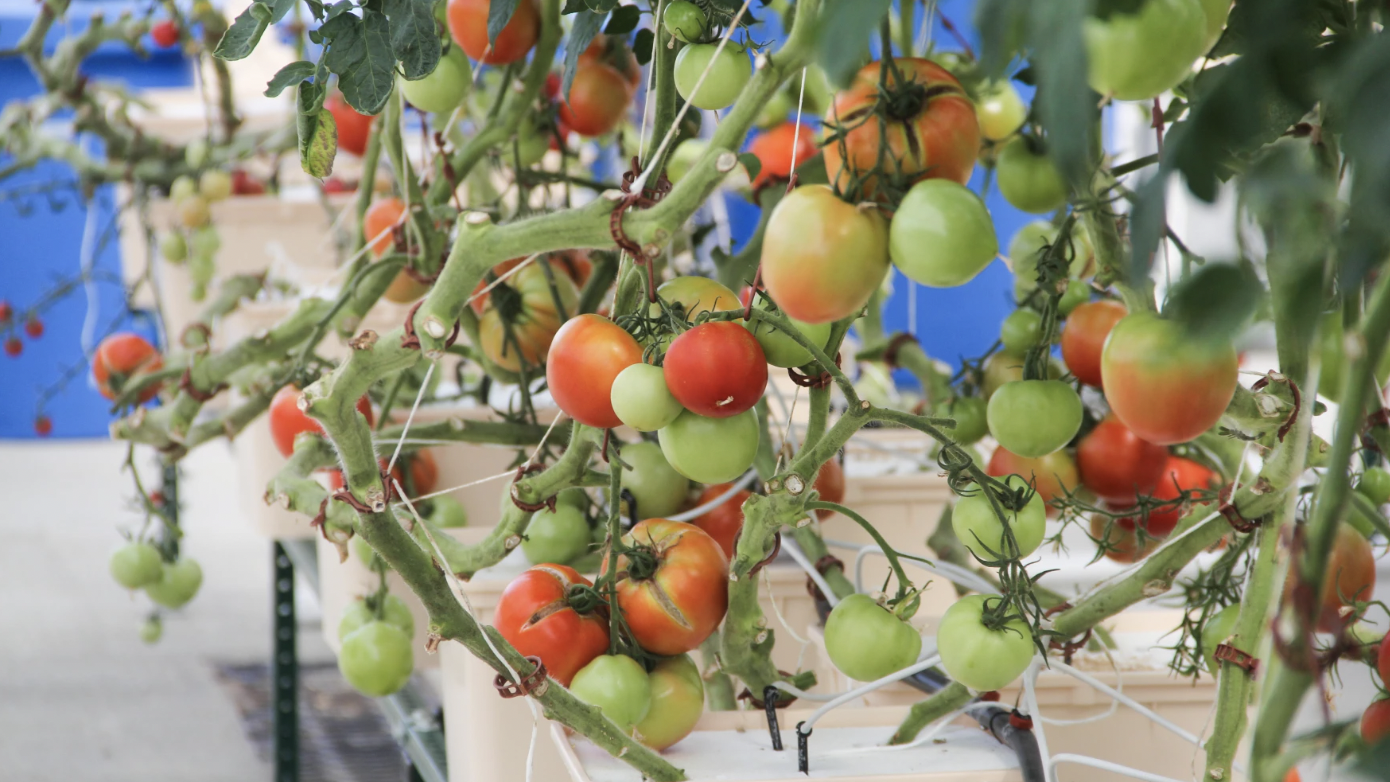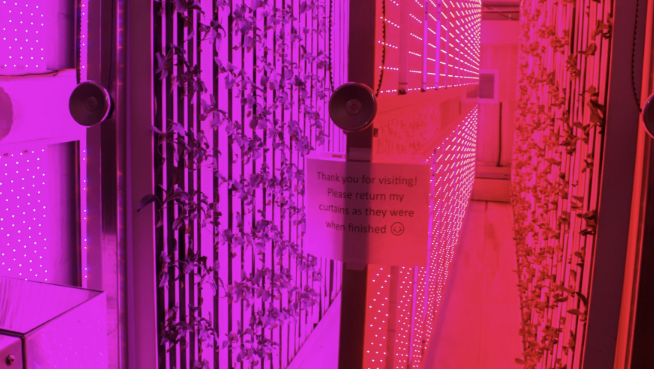Mid-Ohio Food Collective Opens Hilltop Farm To Help Supply Pantries
Lettuce grows in VertiGrow towers at Mid-Ohio Farm on the Hilltop on Wheatland Avenue. The 7-acre "smart farm" that uses innovative farming techniques to grow produce for Mid-Ohio Food Collective's food pantries and markets celebrated its official opening on Tuesday. Allie Vugrincic / WOSU
Mid-Ohio Food Collective celebrated the opening of its technology-rich "smart farm" in the Hilltop on Tuesday, though it's already been producing fresh food for several months.
Everything grown at the seven-acre farm on Wheatland Avenue goes to Mid-Ohio’s food banks and markets. CEO Matt Habash said the farm came from the idea that MOFC had to do things differently to keep up with a growing need.
"One of the realizations we had was we were not going to foodbank our way out of hunger," Habash said. "All the years we've been doing foodbanking, the numbers were getting bigger and bigger."
And not all food is created equal — the produce grown at Mid-Ohio Farm on the Hilltop is nutritious and fresh. Habash said having it provides nutritional security, which is different than food security.
It means having the right kinds of foods that keep people not just full, but healthy.
Habash said about 65% of the food Mid-Ohio Food Collective distributes is fresh — and that's what people want.
Tomatoes grow in a greenhouse at Mid-Ohio Farm on the Hilltop. Allie Vugrincic / WOSU
Mid-Ohio Food Collective has been dabbling in farming for nearly two-and-a-half decades. The nonprofit first started with a small farm in 2010 in Columbus’ Marion-Franklin neighborhood. Mid-Ohio Food Collective lost that farm when the land was purchased.
That won't happen at Mid-Ohio Farm on the Hilltop, The City of Columbus leased the land to MOFC. The project is also backed by a $4.5 million federal Community Development Block Grant and funding from the U.S. Department of Agriculture.
Small plants grow inside Mid-Ohio Food Collective's LED-light year-round mobile growing center at Mid-Ohio Farm on the Hilltop. Allie Vugrincic / WOSU
The Hilltop Farm is situated on the grounds of what was Ohio’s first state psychiatric hospital. It was a brownfield, or land that had been developed and carries pollution from industrial use. For that reason, most of the produce at the farm is not in the ground – it’s floating on hydroponic beds or stacked in towers of buckets.
The site also has a futuristic LED-light year-round mobile growing center housed in a repurposed shipping container.
In the greenhouse alone, Mid-Ohio Food Collective has harvested more than 1,650 pounds of food since March, according to Mike Hochron with Mid-Ohio Food Collective’s communications. That includes more than 1,000 pounds of cucumbers, 400 pounds of lettuce and some 270 pounds of tomatoes.
Mike Hochron with Mid-Ohio Food Collective's communications and public affairs talks about VertiGrow towers used to efficiently grow lettuce at Mid-Ohio Farm on the Hilltop.
Allie Vugrincic / WOSU
Plenty more will be harvested this year from the swooping tomato plants held up by wires. The second round of cucumber plants are already getting large, with some leaves easily larger than a human head.
Habash said Mid-Ohio is trying to use innovative techniques to “grow tall in small spaces.”
“To be able to do this in controlled ways, we can produce a lot of food and then teach people how to do it,” Habash said.
During Tuesday’s ceremony, Congresswoman Joyce Beatty (D-Columbus) praised the farm, saying it was a good example of what can happen when people come together to meet a need.
“This is not a local thing. This is not a regional or state model,” Beatty said. “I’m going to say here today, I’m taking this back to Congress because this a national model.”
Habash, Beatty, and others marked the opening not with a ribbon cutting, but by eating cherry tomatoes grown on site.
In addition to the farm, the larger site has a health center and some affordable and senior housing. Habash said the farm also grows food for the apartment complex and teaches residents how to garden if they choose.
The farm itself is set to be a hub for education.
"A farm gives us an opportunity to think about that differently — to really say, how can we come at this with a way of teaching people how to grow food, teaching kids how important agriculture is?" Habash said.
He said MOFC is just getting started.
“We’ve only had the keys to this place for four months,” Habash said. “This isn’t really about turf, this is about partnering and helping each other all flourish.”
Mid-Ohio Food Collective also grows fresh food at its food pantry in Grove City and has another smaller community garden.
Tags: Health, Science & Environment Mid-Ohio Food Collectiveurban farmingFood Insecurity
Allie Vugrincic has been a radio reporter at WOSU 89.7 NPR News since March 2023.







